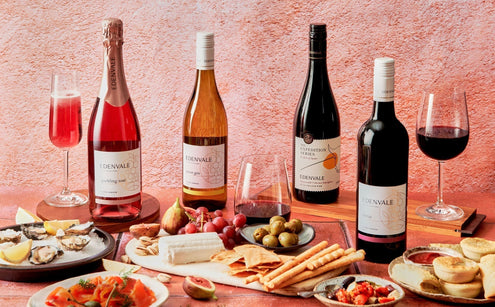De-alcoholised, NOLO, non-alcoholic and alcohol-removed are all terms used to describe alcohol-free wine. We explain the differences.
The sober-curious movement has been gaining traction over the last few years, with initiatives like FebFast and Dry July helping to raise awareness about the benefits of choosing an alcohol-free lifestyle. Non-alcoholic and alcohol-removed wines have become an increasingly popular way to enjoy a social drink without the negative after-effects associated with alcohol.
A NielsenIQ data survey from October 2021 found a 315 per cent increase in online non-alcoholic and low-alcoholic beverage sales from the previous 12 months, and according to market research company Fact.MR, Australia is leading the way as the most lucrative market for non-alcoholic wine in the world.
So as the sans drink movement continues to gain momentum, it’s important to understand what exactly you are consuming and the different terms to be aware of in the alcohol-free wine space.
NOLO, de-alcoholised, alcohol-removed, non-alcoholic – what do they all mean and are they essentially the same thing?
We give you the lowdown on the various terms used to describe products containing “no or low alcohol” to help you make an informed choice.
De-alcoholised & Alcohol-removed
Drinks that have been de-alcoholised are made just like regular alcoholic beverages but after fermentation, almost all alcohol itself is extracted prior to bottling, using procedures such as vacuum distillation (alcohol evaporation methods through heat) and alcohol filtering (known as reverse osmosis). These products are often labelled with statements such as “de-alcoholised wine” or “less than 0.5% alc/vol” and have a significantly reduced alcohol content (similar to levels found in fruit juice) when compared to alcoholic drinks.
Unlike non-alcoholic or alcohol-free beverages (which in most instances contain no alcohol content), Edenvale alcohol-removed wines start out as regular wine before a process of alcohol extraction (or de-alcoholising) is undertaken, using highly sophisticated technology – a custom Spinning Cone Column specifically modified for the alcohol removal process.
The objective of the process of extraction at Edenvale is to decrease the level of alcohol content, while ensuring that a full-bodied wine remains, without having a significant impact on its varietal definition, aromas and flavours. The good news also is that the removal of the alcohol from wine doesn’t impact the health benefits associated with the Polyphenol antioxidants contained in red wine.
NOLO vs. Non-alcoholic – what’s the difference?
No and low-alcoholic beverages (NOLO) refer to products containing little to no alcohol content. According to Food Standards Australia, no-alcohol beverages in general contain less than 0.5% Alcohol by Volume (ABV) and as such, do not require specific labelling in relation to alcohol content. This implies that there is still some alcohol content contained in the beverage, even if it is minimal.
Low-alcoholic drinks contain lower levels of alcohol that would be seen in standard drinks and are still classified as alcoholic because of ABV levels. Beverages can only be classified as having a low-alcohol content if they contain less than 1.15% ABV.
NOLO shouldn’t be confused with the closely related terms of non-alcoholic, alcohol-free or zero alcohol. These terms are aligned with beverages that contain no levels of alcohol whatsoever (0% ABV). Non-alcoholic drinks are produced without any fermentation and are often made up of just grape juice and water.
Vacuum Distillation & Vaporisation
There are two main ways in which alcohol can be removed from wine, with the most common method utilising a vacuum distillation process. Vacuum distillation involves heating the wine to the lowest temperature possible (typically less than 30 deg Celsius), where the alcohol evaporates and the aromas are subsequently added back to the wine afterwards. The result is alcohol-removed wine that still has all the aromas and robustness of the original wine.
Spinning Cone Columns involve repeated evaporation and condensation at low temperatures to separate the various components in wine so the ethanol can be discarded. At Edenvale, the advanced Spinning Cone Column removes alcohol from the base wine through a careful process of vacuum distillation, in order to protect the delicate aromas and varietal flavours. The wine is then refined, purified and put through a blending process to return volume and sweetness, achieved by adding a small amount of grape concentrate (6%).
Alcohol-free wines made by these methods have no more than 0.5% trace amounts of alcohol remaining in them.
ABV
ABV (Alcohol by Volume) is the measurement used to calculate the specific amount of alcohol that is contained in an alcoholic beverage and is often referenced alongside the commonly known term “standard drinks”.
As a guide, naturally occurring fruit juice will contain an ABV of between 0 and 0.5%, while a standard beer could contain an ABV of between 2 and 5% and red wine an ABV of 13.5%. Edenvale wines are approximately between 0.2 and 0.3% ABV, well below the International Standard for a non-intoxicating beverage.
Standard Drinks
A standard drink is a unit of measurement used to assess the amount of alcohol an individual consumes. Standard drinks will vary depending on the type of alcohol consumed, the different serves and strength of each beverage. The general rule in Australia is that a standard drink is always equal to 10 grams of pure alcohol. A bottle of Edenvale alcohol-removed wine contains 0.0 standard drinks.
Australian food labelling law requires all packaged alcohol to include the number of standard drinks on its label. Counting your standard drinks can help you stay within the NHRMC Guidelines.
Concentration
De-alcoholised wine may have grape juice or grape juice concentrate added back in after the alcohol-removal process, to enhance taste and body, while replacing loss of water. As such, wines produced by Edenvale have at least the same levels of antioxidants or even higher as their full alcoholic counterparts. This is due to the concentration of the wine when the alcohol is removed.
Sulfites
Sulfites, also commonly called sulfur dioxide, are a group of chemical compounds found naturally in some foods and added to others as a preservative. Sulfites can help winemakers minimise oxidation (preventing liquid turning brown) and maintain the flavour and freshness of wine, thanks to their antimicrobial properties. Sulfites are a normal by-product of the winemaking process, naturally occurring in wine as part of fermentation.
With Edenvale, consumers can enjoy a sophisticated beverage such as a Sauvignon Blanc, Pinot Gris, Pinot Noir or Cabernet Sauvignon, without the effects of alcohol.
Edenvale’s range of alcohol-removed wines can be found at local Woolworths, Coles, Dan Murphy’s, IGA and independent retailers throughout Australia.




